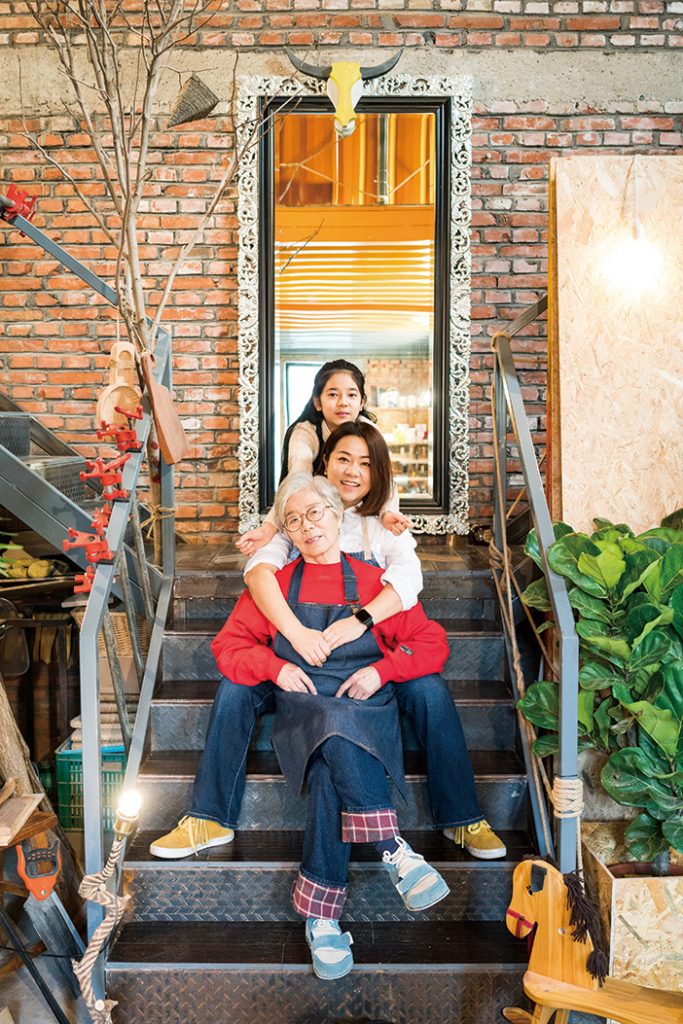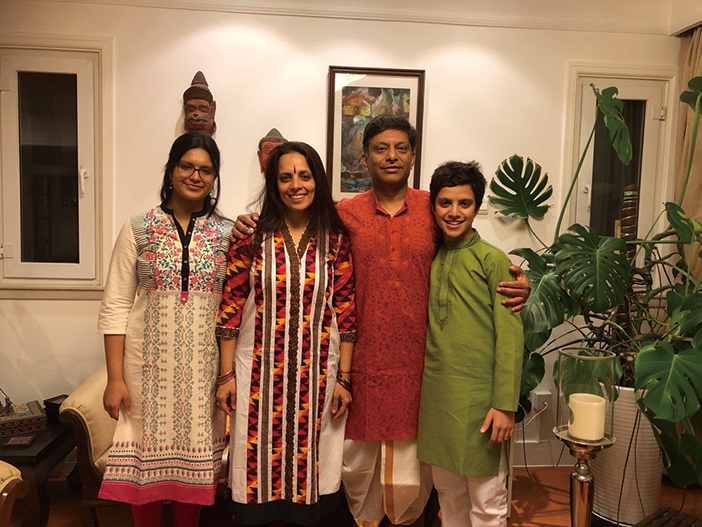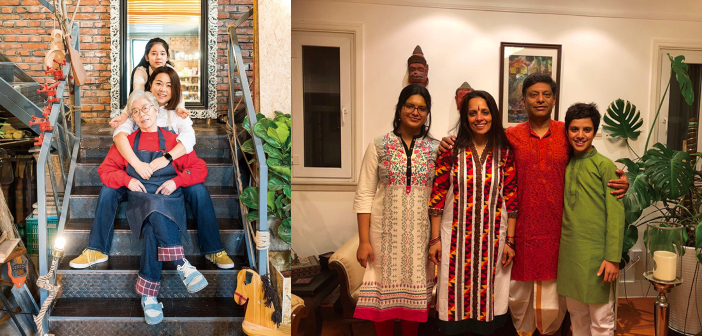In our regular magazine piece ‘West Meets East’, we interview two Beijing families from two different cultural backgrounds about the same topic. This month, we talked to the Zhao family from China and Trivedi-Bajpai family from India about their parenting philosophies.

China: The Zhao family
Collin Zhao and wife, Tina, hail from two very distinct cities in China, with Collin coming from Shanghai and Tina from Beijing. Together, they have a 12-year-old daughter named Annie. Mr. Zhao is the photographer in the family, who loves taking photos, but is always a reluctant model. Tina loves making jokes to help brighten people’s mood in the family.
*in the photo are Grandma, Tina, and Annie. Photographer dad Collin is (once again) behind the camera.
When you were a kid, were your parents more like “helicopter parents” or “free-range parents”?
My parents were more like “free-range parents.” I don’t remember my parents ever making me stay up late to study, or punishing me when I didn’t finish my homework. My mom was always the one who took care of my daily-basis like clothes, food, and transportation. My dad was the one who inspired and encouraged me to explore the world.
How would you react to your parents whenever they tried to make decisions for you when you were young?
I don’t think my parents had ever tried to make decisions for my life. At that time, my parents worked hard for the whole family. Sometimes we had to move to another city due to their work, so I had to change my school, but I just got used to the life, to saying goodbye to old friends and making new friends.
Have you ever wanted to control your child’s life or make decisions for your child? What did you do in this situation?
When our daughter was still a baby we had to make decisions for her, like when to feed her, when to change her diaper, when to give her a bath, and when to give her a baby massage. As time passes by, she gradually grows her own awareness and hobbies, and we respect that. For example, she likes dancing when she hears the music, and then we keep it in mind.
Are you satisfied with your child’s academic performance? Would you ever compare your child’s academic achievements with other kids?
We all think studying is more like a journey to get to know the world and make friends, instead of comparing academic performance. Even though it’s inevitable to focus on the grade in public schools, we still encourage Annie to choose the field she likes, and manage her own time to take a break or keep studying further. We expect her to gain more interest in study.
What would you do if your child has a crush or is in a relationship while in middle school?
We think in any relationship, the most important thing is to remember to love ourselves. Instead of trying to figure out how to avoid it, we want our daughter to feel comfortable enough to communicate with us.
Has your child done anything particularly rebellious so far?
Actually, with an open-minded attitude to educate and communicate with our daughter, we treat her as independent. Therefore, being particularly rebellious is probably a false proposition here.
Do you know anything about your child’s current stress or problems?
Some things I can see with my kid is her generation’s lack of close communication with her friends. I feel like in our generation, there were closer friendships, but our child’s generation seems like it has a difficult time being able to bond on a more personal level. In addition to that, our kid has a difficult time saying no to requests or favors because she wants to be nice.

India: The Trivedi-Bajpai family
Shruti Bajpai and her husband, Mayank Trivedi, are originally from India. They have lived in different countries and cities in Asia before moving to Beijing, which has made them fans of Chinese culture and traditions. Over the past few years, together with their children, Sharanya and Suvarn, both happy students at Dulwich College Beijing (DCB), they have traveled extensively within mainland China, from the heights of Tibet to the inviting landscape of Xinjiang and the varied culture of Gansu Province. As a family, they love watching Chinese movies in theaters and have thoroughly enjoyed recent hits like Wandering Earth, Dying to Survive, and The Farewell.
When you were a kid, were your parents more like “helicopter parents” or “free-range parents”?
Both my husband and I grew up in India in a typical middle-class Indian household with traditional Indian values. Our parents were neither helicopter nor free-range, but a balanced mix of the two. We were pushed to excel in academics (that came with the territory), but also in our areas of interest, even if they were non-academic. In hindsight, I think that the one value our parents instilled in us was to give our 100% to whatever we did, whether it would be our own interests or school work. This has indeed held us in good stead, and this is something that we encourage our children to do.
How would you react to your parents whenever they tried to make decisions for you when you were young?
Most of the time, we went along with them deciding for us, as that was the social norm at the time. We didn’t question them, obedience to parents is a very strong trait in all of Asia. But I do remember that there were times where I resented this control and would argue vehemently, mostly unsuccessfully, but I had small wins too.
Have you ever wanted to control your child’s life or make decisions for your child? What did you do in this situation?
I would like to say no, but the honest truth is yes. And now, as freshly minted teenagers who know to speak their minds, our children push back. But thankfully, our frequent discussions about decision-making or control are healthy and we reach a mid-point at times, and at other times, they give in. Increasingly, there are times that we, as parents, have to give in too.
Are you satisfied with your child’s academic performance? Would you ever compare your child’s academic achievements with other kids?
Yes, we are happy that our children are both academically inclined and do give their best to everything they do in school. And while we do try to avoid comparison, it does slip in, more often than not. And the children are quick to call us out on this.
What would you do if your child has a crush or is in a relationship while in middle school?
I think crushes are common, middle school onwards, and I would consider this normal for my kids. But being in a relationship in middle school, to me, is a bit too early because the teenage brain is still developing and may not fully grasp the nuances and complexities of a relationship at a relatively young age.
Has your child done anything particularly rebellious so far?
Knock on wood, no. While we do have a lot of runins with our kids, (they think that we belong to the stone age), it’s all in good humor. We are able to talk about issues that bother them.
Do you know anything about your child’s current stress or problems? How do you help him, and if not, how would you?
Yes, we do know a lot of our children’s stress problems. Do we know everything? No. There is so much that we need to learn too. I personally try to read up on practices to build empathy and often seek advice on how to be a better listener. My husband, on the other hand, tends to engage directly with our children and talk it out with them. But this is a work in progress for both of us — sometimes we are successful, at other times we are hopeless resolving a difficult situation. For us, frequent family holidays prove to be a great stress-buster and give us a chance to build better communication. Over the past three years, we have traveled extensively within China. These holidays have helped us understand each other better.
KEEP READING: Parents “Trash Talk” About Involving Kids in Sustainable Living
Photos: courtesy of Colin Zhao, Shruti Bajpai
 This article appeared in the beijingkids 2020 May issue
This article appeared in the beijingkids 2020 May issue




